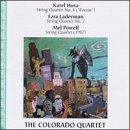| All Artists: Karel Husa, Ezra Laderman, Colorado Quartet, Mel Powell, Julie Rosenfeld, Deborah Redding, Francesca Martin Silos, Diane Chaplin Title: Husa: String Quartet No. 4; Laderman: String Quartet No. 7; Powell: String Quartet 1982 Members Wishing: 0 Total Copies: 0 Label: Albany Records Release Date: 10/14/1997 Genre: Classical Style: Chamber Music Number of Discs: 1 SwapaCD Credits: 1 UPC: 034061025924 |
Search - Karel Husa, Ezra Laderman, Colorado Quartet :: Husa: String Quartet No. 4; Laderman: String Quartet No. 7; Powell: String Quartet 1982
 | Karel Husa, Ezra Laderman, Colorado Quartet Husa: String Quartet No. 4; Laderman: String Quartet No. 7; Powell: String Quartet 1982 Genre: Classical
|
Larger Image |
CD Details |
CD ReviewsModern quartets that sound fantastic Joe Canoe | 06/07/2000 (5 out of 5 stars) "This disc has the honor of being the only contemporary music disc I've listened to more than 4 times. Having heard them play the Husa and Laderman live as well, it's easy to hear that these are well-constructed, highly interesting pieces played to perfection - just listen to the "Bells" movement of the Husa. The liner notes are also full of information. This is definitely one of the best quartets out there, from Haydn to Husa their playing is spectacular." Husa's 4th Quartet: novel compositional and playing techniqu Discophage | France | 03/02/2007 (4 out of 5 stars) "Karel Husa won the much-coveted Pulitzer-Prize with his 3rd String Quartet, composed for the Fine Arts Quartet in 1968, recorded by them, along with the 2nd, for Everest records and reissued on CD by Phoenix (see my review of String Quartets No.2 and No.3). Both are masterpieces, the 2nd a fierce, post-Bartok composition and the 3rd a highly virtuosic piece in which Husa used a wide array of daring playing techniques exploited to fascinating coloristic effects. I was then eager to hear his evolution as a composer of string quartets. His 4th was written in 1990 and is much in the same vein as the 3rd but somewhat more gentle and subdued. It has six movements (the "Poems" of the title) playing without break, each bearing a title that is more evocative than descriptive. "Poems" indeed, as they use the same kind of unusual playing techniques and color effects as the 3rd, which have become trademarks of Husa's mature style. With its rarified textures and use of high-pitched, hushed sonorities, the 2nd movement ("Sunlight") reminds of Cage's Quartet or moments in Crumb's "Black Angels" or again the music of Salvatore Sciarrino, the 3rd ("Darkness") evokes (to me) a swarm of bees or flies with its strings playing long held notes in their lower registers with quarter-tone glissandos. Beginning in the mood of "Sunlight" with hushed, eerie glissandos played on string harmonics, the 4th movement ("Hope") features a build-up of tension around a passionate and tormented cello cantilena and so does the last one, "Freedom", while the fifth, "Wild Birds", is an etude in scurrying and anguished agitation, again reminiscent of Crumb's "Black Angels" - but, it must be said, without the latter's terrifying sonic invention and amplified strings. There is nothing here as strikingly inventive and original as Crumb's "Black Angels" or Ligeti's 2nd String Quartet, but I find Husa worthy of praise in his striving to reconcile the innovations in compositional and playing techniques and his quest for expressivity and dramatic impact. Ezra Laderman's 7th Quartet is more traditional in that it is based on the time-honored method of melodic development and contest of motivic ideas, couched in a stern, stark and sometimes thorny post-Berg-Schoenberg musical language. It ends (from 17:27 on) with a desolate and powerful funeral march of quasi-Hindemithian mould. As one might have expected from a composer so associated, along with Elliott Carter and Milton Babbitt, with the American brand of serialism, the String Quartet of Mel Powell is in a way a cliché of "contemporary music": an apparently gratuitous succession of thorny, gnarled phrases, even sonic cells, sometimes mere sound effects (pizzicatti, sul ponticello tremolos and the likes). Not that it is meaningless, on the contrary, it is very tightly organized, starting from tangled complexity and progressing, in the course of its 14 minutes, towards enigmatic bareness; but it is unseductive and tough to crack. The notes contain lengthy bios of Laderman's and Powell and thorough descriptions of their respective work, but are much more succinct on Husa. There is only one index point per quartet, which is very inconvenient, especially in Husa's where the various movements are not separated. They begin (other than the first) at 2:29 ("Sunlight"), 4:42 ("Darkness"), 6:25 ("Hope"), 11:16 ("Wild Birds") and 16:59 ("Freedom"). " Powell String Quartet is magnificent Joe Canoe | 10/17/2004 (4 out of 5 stars) "Mel Powell's string quartet is THE reason to get this disc. It's so fantastic that it should probably earn this disc five stars, if only two other recordings weren't available. (Repertoire-wise, the Powell recording by the Composers Quartet makes that disc a good choice, with tasty items by Carter and Babbitt to round out the program. But try and find the all-Powell disc on Music & Arts with the best performance by the Sequoia Quartet.) The first violin melody that emerges in the coda of the Powell quartet is the most beautiful of any written in the second half of the 20th century."
|

 Track Listings (3) - Disc #1
Track Listings (3) - Disc #1